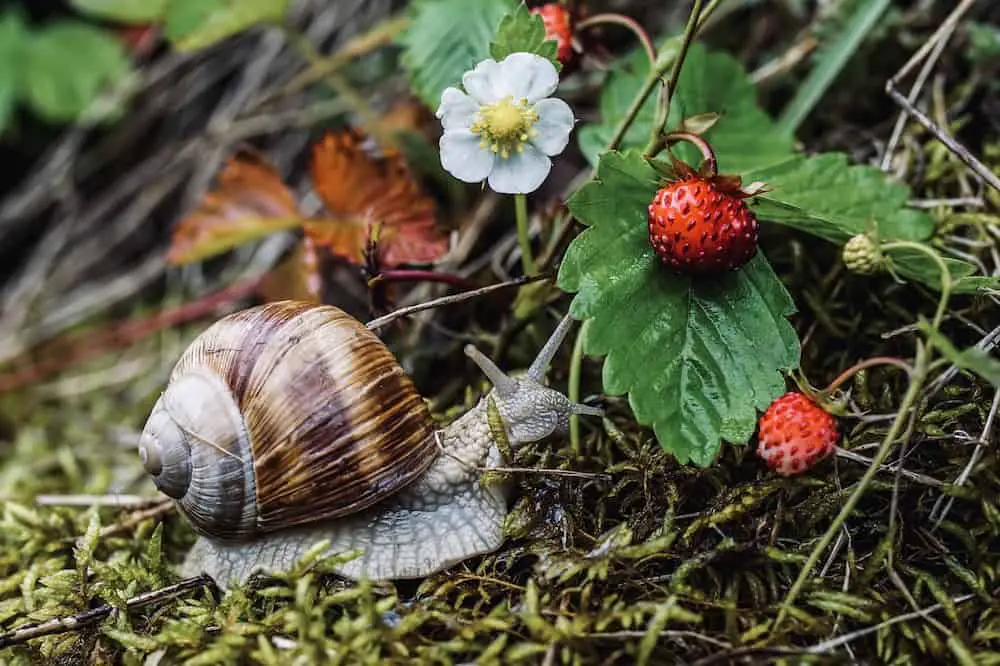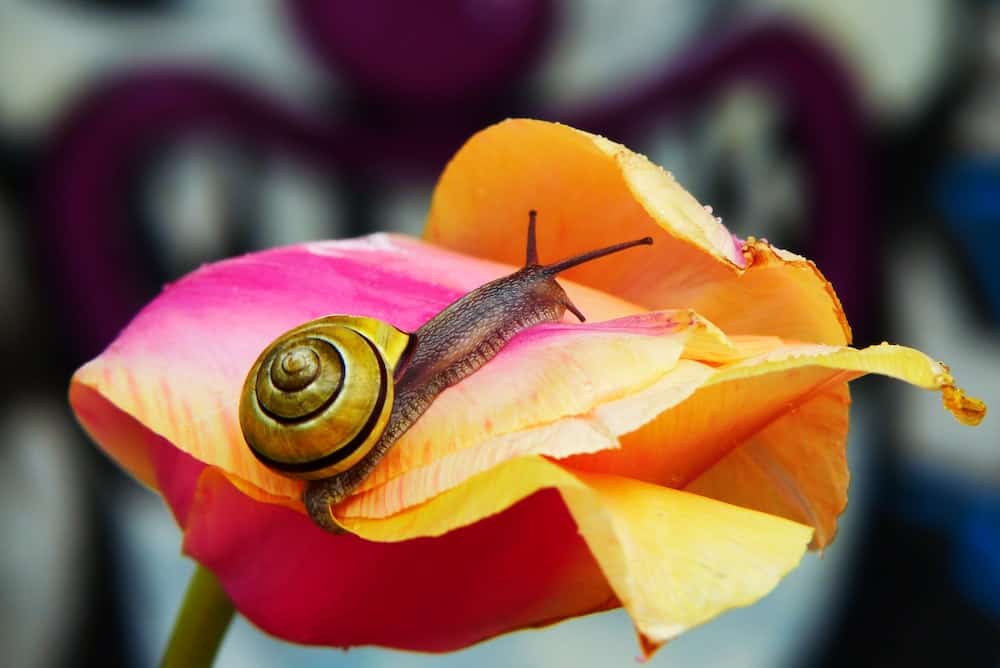Many gardeners will be turning to their gardens as winter comes to its close. And with a return to the garden comes a return to controlling bugs and pests that may disturb your crops, including slugs.
While these slow-moving little guys may be irritating, would it be cruel to salt them as a natural pesticide?
Yes, it is cruel to salt a slug. Pouring salt on a slug triggers osmosis and causes the slug to die a slow, painful death of dehydration. Humans would experience a similar effect by pouring salt into their open eyes.
We’re going to explain the science of salting a slug and some more humane pest prevention strategies you can explore in your home garden.
If you just want the humane alternatives, click here.
Why is Salting a Slug Cruel and Unethical
What Happens When You Salt A Slug?
Pouring salt on a slug triggers the process known as osmosis. Osmosis is "the process that occurs when a solution meets a permeable membrane." The "solution" being referred to here is the homogenous mixture of the salt you are adding and the primarily water-based insides of the slug.
A slug's exterior is a permeable membrane, which means certain substances, like salt, can easily pass through it.
The salt-water solution has a higher salt concentration than the water inside the slug. Osmosis then begins to try and dilute the solution and even things out.
While trying to even things out, the slug will usually dehydrate completely, shrivel up and die.
Dying a slow death of dehydration would never be considered humane by any standard, which is why salting a slug is not the best way to protect your garden.
Do Slugs Feel Pain When You Put Salt on Them?
Although slugs do not scream when you pour salt on them, they can potentially feel pain.
The subject of pain in slugs and snails is controversial. Research has shown that sea slugs/molluscs demonstrate pain perception through a scientific process called nociception.
In other words, sea slugs can avoid danger when they perceive pain.
However, the next part of the debate is whether a slug can experience pain.
Something can only feel pain with the presence of a conscious brain, and although sea slugs have a nervous system, they do not possess a brain and therefore should not be able to experience pain.
Regardless of which side of the fence you belong to, we still believe there are better ways to get rid of these garden pests, and next, we discuss humane alternatives.
What Is the Humane Way to Get Rid of Slugs?
There are a variety of different ways to get rid of slugs. Changing habits is a good start. Increasing your garden's biodiversity and introducing predators, and creating barriers (some are better than others) can help deter garden pests.
Change a Few Habits to Save Time
Increase Your Garden’s Biodiversity
Introduce Predators to act as Natural Pest Control
It turns out the most humane way to "kill a slug" is to let nature take its course. Introducing and cultivating these predators into your garden can deter slugs and other pests. Allow natural predators to find slugs and snails and eat them.
There are several natural predators to slugs, and you should be able to attract some of them to your garden. They include:
Increasing your garden's biodiversity can bring a generous array of benefits, including natural and economical pest control.
Use Plants that Deter Slugs
Some plants that slugs show little or no interest in include:
Focus on strongly scented plants such as lavender, rosemary, begonias, and sage will deter slugs. Slugs also dislike fuzzy or furry foliage, so make use of these types of plants.
Other slug repellers include ferns, cyclamen, hydrangea, California poppy, nasturtium, and lantana. While the above is certainly not a comprehensive list, head right over here for more options.
Use a Sacrificial Bed
A great way to distract snails and slugs from your garden to save plants is by using a sacrificial bed. These sacrificial beds can be placed in the garden corner, and consist of all the flowers and plants slugs love. Although using sacrificial beds may be difficult in smaller gardens, they effectively collect and remove garden pests.
If you choose to create a sacrificial bed, here are some great options for that area:
For more sacrificial bed ideas, look over here.
If you'd instead create barriers to protect your garden and avoid killing them altogether, there are several possible solutions.
Create Natural Barriers
Slugs have soft bellies and do not like sliding over rough surfaces. Coffee grounds, wood ashes, sand, crushed eggshells, and diatomaceous earth are effective when sprinkled around plants.
What Methods of Handling Slugs Should You Avoid?
There are also slug deterrent paints and electric slug fences. These two are not as preferable as they can cause harm to the slug. The paint could be toxic to the slug, and the electric fence causes obvious and immediate harm. They are both decidedly more costly than the other options.
Doing some research online will often turn up a lot of tips and tricks for managing slugs.
While many of them will claim to be the best or most humane way to handle them – more often than not, the methods are cruel, and you should avoid them.
Don't Cut Slugs with Garden Tools
Some folks suggest that this is the quickest and most humane way to kill a slug. While one can't argue with the rapid death, it is impossible to say it is humane or painless.
Additionally, this often brings more problems than with what you started. The smell of rotting slugs can attract even more pests to the area.
Don't Use Slug Baits/Pellets
Slug pellets are tiny poisons designed to attract and kill slugs. The pellets use either metaldehyde or iron phosphate to kill the slugs.
Not only can these poisons be dangerous to humans and pets, but they also are far from painless deaths.
After eating metaldehyde, the slug will try to flush the poison from their body and effectively dehydrate themselves to death in the process. This process can take several hours.
Iron Phosphate works a little differently as it blocks the slug's digestive tract and effectively starves them over several days.
At best, using slug pellets is a temporary, expensive, and painful solution. It may temporarily fix the problem but often causes more problems than you originally had.
Don't Pour Boiling Water on Slugs
Slugs are mostly water and live in mild climates. Boiling water will kill them, and there is no reason to believe it is any less painful than boiling water and pouring it on any other animal.
Don't Freeze Slugs
Much like the boiling water tip above, there is no reason to believe that this is quick or painless for slugs.
It essentially hides the process from view so that it may be easier for your mind, but slugs, like most animals, will suffer in extreme temperatures.
Don't Use Beer Traps to Kill Slugs
You may have read about beer traps for slugs. In this method, you leave out beer bottles, slugs find their way into them, and die a happy drunk drowned death.
However, we can't prove this is a painless death. And besides, wasting beer does not sound like a good idea to us anyways.
Final Word
Salting a slug is a quick solution that causes more harm than good. The slug suffers from dehydration, and any other quick slug removal tips also probably hurt more than help. These solutions can be costly and painful to more than just the slug.
The best garden is a garden rich in biodiversity. Cultivate a garden full of plenty of wildlife, and nature will handle all of the pest control for you at no extra charge.


